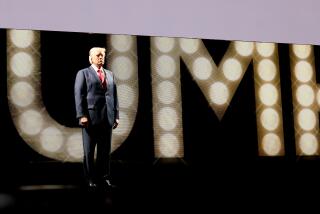Republican donors, RNC push in different directions
- Share via
PARK CITY, Utah — After women, young voters and Latinos fled from the Republican Party in droves in 2012, some GOP leaders thought they had a chance to turn things around.
They embarked on a “listening tour” and put out a report acknowledging that many voters viewed the party as intransigent and suffused with old white men. But change has come slowly. While some Republican senators are working in Washington on a bipartisan immigration package that they hope will improve the party’s image, the debate over social issues and gay marriage continues to dominate, and relations between conservative tea party factions and more moderate party elements seem as fractious as ever.
Perhaps no group is more frustrated by the party’s slow march forward than the high-powered donors and business, technology and industry leaders who met for a three-day retreat here hosted by former Republican presidential nominee Mitt Romney.
Looking ahead to the 2014 congressional races and the 2016 presidential contest, many Romney donors said they were concerned about the ease with which sharply conservative Republican candidates — such as Todd Akin of Missouri, who churned up a firestorm with his controversial comments on rape — had tainted the party’s image.
A number of donors also said damage persisted from Romney’s shift to the right on issues such as illegal immigration and his emphasis on his opposition to gay marriage.
“We have to open the tent to a broader constituency,” said Anthony Scaramucci, a national finance co-chairman who helped lead Romney’s fundraising operations in New York.
“The party needs to tie itself to social inclusion and fiscal responsibility. That means any race, any creed, any sexual orientation, any issue related to the reproductive power of women — any of those groups need to feel at home in the Republican Party,” Scaramucci said.
Susan Crown, a 2008 supporter of President Obama who became a key fundraiser for Romney, said that “the extremists — the 2% on either end — were the squeaky wheels that dictated the conversation.”
The party, she said, “really has to reconcile its fundamental principle, of government staying out of the people’s lives, with its recent history.”
The views expressed by many donors in interviews this week about the direction the party should take stood in stark contrast to the current concerns of the 168 members of the Republican National Committee, who determine the party platform and its rules.
At an RNC gathering this spring in Hollywood, committee Chairman Reince Priebus had hoped to keep the focus on the party’s rebuilding efforts after being vastly outmanned by Obama’s campaign operation, including the Democrats’ sophisticated voter identification systems and the strength of their ground organization in the key swing states.
Instead, many RNC members wanted to talk about how the party should not stray from its core principles on social issues, which remain singularly important to many party activists. During the meeting, RNC members unanimously pushed through a resolution affirming that marriage should be between a man and a woman.
If party leaders are skittish about having a messaging fight right now, that is not the case for many former Romney donors, who seemed eager to discuss how the party should alter its message attract more women and Latinos.
Romney famously advanced the idea of “self-deportation” in the primary, to his detriment among Latinos. But many of his donors said they were encouraged by movement on an immigration bill in the Senate.
The conversations last year about deporting more than 11 million illegal immigrants were harmful to Republican efforts, said Andrew Puzder, the California-based chief executive of CKE Restaurants Inc. He noted that mass deportation would require an enormous expansion of government, which to him seemed antithetical to Republican views.
“We’re losing for a policy that we couldn’t even implement,” Puzder said in an interview in Park City. “We have to be more careful with our selection of candidates.”
(Even as the donors talked up the bipartisan bill last week, House GOP members sent a difference message, voting to de-fund Obama’s effort to give legal status to immigrants brought to the country as children.)
As for the 2016 messaging, potential contenders who came to woo Romney donors in Park City all emphasized the need for the party to become more inclusive.
Wisconsin Rep. Paul D. Ryan, the House Budget chairman, kept his remarks focused on the nation’s fiscal problems. Kentucky Sen. Rand Paul outlined his views on the controversies over government surveillance and foreign policy, as well as his own efforts to engage young voters on some of those issues.
But perhaps surprisingly given his recent scuffles with his own party, donors said the potential candidate who got the warmest response was New Jersey Gov. Chris Christie.
Christie fired up the room, according to several accounts, by delivering a speech about the importance of bipartisanship and finding common ground with Democrats.
He was the only one of the three would-be candidates, donors said, who got a standing ovation.
More to Read
Sign up for Essential California
The most important California stories and recommendations in your inbox every morning.
You may occasionally receive promotional content from the Los Angeles Times.











